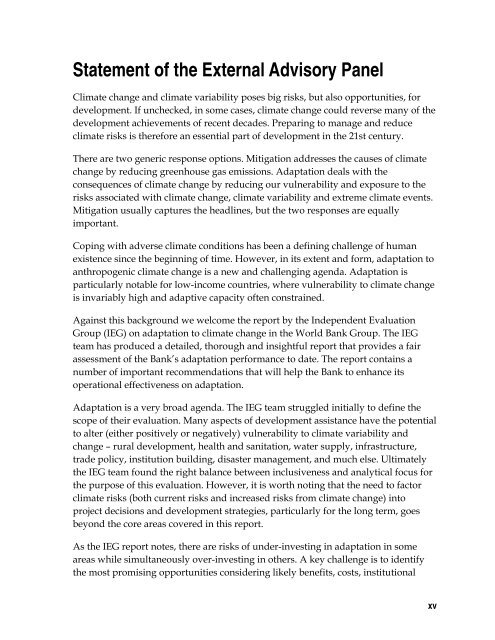Adapting to Climate Change: Assessing the World Bank Group ...
Adapting to Climate Change: Assessing the World Bank Group ...
Adapting to Climate Change: Assessing the World Bank Group ...
You also want an ePaper? Increase the reach of your titles
YUMPU automatically turns print PDFs into web optimized ePapers that Google loves.
Statement of <strong>the</strong> External Advisory Panel<strong>Climate</strong> change and climate variability poses big risks, but also opportunities, fordevelopment. If unchecked, in some cases, climate change could reverse many of <strong>the</strong>development achievements of recent decades. Preparing <strong>to</strong> manage and reduceclimate risks is <strong>the</strong>refore an essential part of development in <strong>the</strong> 21st century.There are two generic response options. Mitigation addresses <strong>the</strong> causes of climatechange by reducing greenhouse gas emissions. Adaptation deals with <strong>the</strong>consequences of climate change by reducing our vulnerability and exposure <strong>to</strong> <strong>the</strong>risks associated with climate change, climate variability and extreme climate events.Mitigation usually captures <strong>the</strong> headlines, but <strong>the</strong> two responses are equallyimportant.Coping with adverse climate conditions has been a defining challenge of humanexistence since <strong>the</strong> beginning of time. However, in its extent and form, adaptation <strong>to</strong>anthropogenic climate change is a new and challenging agenda. Adaptation isparticularly notable for low-income countries, where vulnerability <strong>to</strong> climate changeis invariably high and adaptive capacity often constrained.Against this background we welcome <strong>the</strong> report by <strong>the</strong> Independent Evaluation<strong>Group</strong> (IEG) on adaptation <strong>to</strong> climate change in <strong>the</strong> <strong>World</strong> <strong>Bank</strong> <strong>Group</strong>. The IEGteam has produced a detailed, thorough and insightful report that provides a fairassessment of <strong>the</strong> <strong>Bank</strong>’s adaptation performance <strong>to</strong> date. The report contains anumber of important recommendations that will help <strong>the</strong> <strong>Bank</strong> <strong>to</strong> enhance itsoperational effectiveness on adaptation.Adaptation is a very broad agenda. The IEG team struggled initially <strong>to</strong> define <strong>the</strong>scope of <strong>the</strong>ir evaluation. Many aspects of development assistance have <strong>the</strong> potential<strong>to</strong> alter (ei<strong>the</strong>r positively or negatively) vulnerability <strong>to</strong> climate variability andchange – rural development, health and sanitation, water supply, infrastructure,trade policy, institution building, disaster management, and much else. Ultimately<strong>the</strong> IEG team found <strong>the</strong> right balance between inclusiveness and analytical focus for<strong>the</strong> purpose of this evaluation. However, it is worth noting that <strong>the</strong> need <strong>to</strong> fac<strong>to</strong>rclimate risks (both current risks and increased risks from climate change) in<strong>to</strong>project decisions and development strategies, particularly for <strong>the</strong> long term, goesbeyond <strong>the</strong> core areas covered in this report.As <strong>the</strong> IEG report notes, <strong>the</strong>re are risks of under-investing in adaptation in someareas while simultaneously over-investing in o<strong>the</strong>rs. A key challenge is <strong>to</strong> identify<strong>the</strong> most promising opportunities considering likely benefits, costs, institutionalxv

















